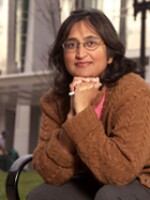DEBBIE ELLIOTT, host:
In Houston Federal Court today, a prominent medical researcher testified Merck & Co. knew its painkiller Vioxx was risky years before the death of a man whose family is now suing the drugmaker. The jury in the case has to decide whether Vioxx contributed to the fatal heart attack suffered by Richard "Dickey" Irvin of St. Augustine, Florida. Merck denies any link between Vioxx and the death. NPR's Snigdha Prakash has been at the trial and joins us now from Houston.
Tell us more about today's witness.
SNIGDHA PRAKASH reporting:
His name is Eric Topol. He's the chairman of the Department of Cardiology at the Cleveland Clinic, and he was an early, prominent and persistent critic of Vioxx, but he stayed aloof from the plaintiffs in this huge burgeoning Vioxx litigation. He actually had to be subpoenaed by a federal judge to testify in this trial, and that may add to his credibility with the jury, who heard from him for about two hours via videotape today.
ELLIOTT: What did he say?
PRAKASH: Well, you know, in opening statements, Debbie, the plaintiff's lawyer told the jury, `Do me a favor. Write this question down in your notebooks: When did Merck know that Vioxx was risky?' Merck says it didn't know until last year, and then as soon as it found out, it pulled the drug from the market. Well, Topol today gave a very different answer to that question. He told the jury that even before Vioxx was approved, an FDA official had raised concerns that patients on Vioxx were getting a lot of blood clots. So he said that was a warning.
Then he said after the drug was approved in 1999, Merck got results of a thousand-patient study. Now that's not a huge study, but it's not trivial, and Topol said in that study, the Vioxx patients had more heart attacks, 760 percent more heart attacks than the patients on an older painkiller. Topol told a jury the results of that study were never published, and in fact, the information that Merck did share about it was misleading.
Finally he told the jury, in 2001 Merck did a second much bigger study called the VIGOR trial and it had more than 8,000 patients. Half were on Vioxx, half were on Aleve, and he said in that study, patients on Vioxx had five times as many heart attacks. Merck told doctors, `Well, that's happening not because Vioxx is risky but because this older drug is just great for heart,' and Topol essentially told the jury today that just doesn't make scientific sense.
ELLIOTT: You say he sounded the alarm on Vioxx many years ago. Yet he almost sounds like he was a reluctant witness in this case.
PRAKASH: Yes, he was a reluctant witness. His feeling is basically that he doesn't want to get involved in lawsuits. You know, he wants to do his science and speak out in the public domain and through the medical literature, but he doesn't want to take sides.
Let me tell you a bit about the alarm he sounded. He wrote a paper several years ago, a paper that now looks like an oppression paper, in which he told doctors essentially that this bigger study, this 2001 study, probably means that Vioxx is a problem for the heart. And he said, `Look, we need a study that'll answer the question definitively: Is Vioxx risky for the heart or not? Let's test that and let's test it in patients who have heart disease,' 'cause a lot of patients who were on Vioxx for their rheumatoid arthritis, in fact, have heart disease and some people think, you know, maybe 50 percent of patients who were on Vioxx had heart disease.
So Topol told jurors today that for those people, Vioxx was a public health disaster. He said the kind of trial that he called for was never done, but he said, you know, the heart risks of Vioxx were proven.
ELLIOTT: How did Merck respond to Topol's testimony?
PRAKASH: Merck hasn't responded directly to Topol's testimony. Both sides have been forbidden by the judge in the case from talking to reporters, and they are obeying, but Merck has maintained for many years that their explanation of the results that they got back in 2001 was scientifically valid. They say that it would have been unethical to do the kind of trial that Topol was calling for, and they say that they acted throughout in the best interests of patients.
ELLIOTT: Thanks. NPR's Snigdha Prakash in Houston, thank you.
PRAKASH: Thank you, Debbie. Transcript provided by NPR, Copyright NPR.




